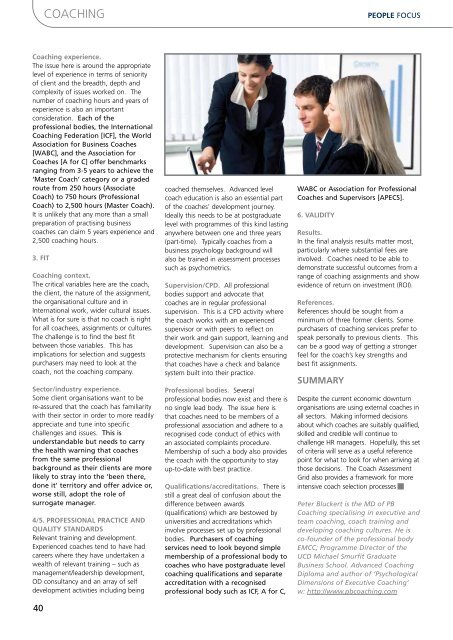PEOPLE FOCUS - CIPD
PEOPLE FOCUS - CIPD
PEOPLE FOCUS - CIPD
You also want an ePaper? Increase the reach of your titles
YUMPU automatically turns print PDFs into web optimized ePapers that Google loves.
COACHING<br />
<strong>PEOPLE</strong> <strong>FOCUS</strong><br />
Coaching experience.<br />
The issue here is around the appropriate<br />
level of experience in terms of seniority<br />
of client and the breadth, depth and<br />
complexity of issues worked on. The<br />
number of coaching hours and years of<br />
experience is also an important<br />
consideration. Each of the<br />
professional bodies, the International<br />
Coaching Federation [ICF], the World<br />
Association for Business Coaches<br />
[WABC], and the Association for<br />
Coaches [A for C] offer benchmarks<br />
ranging from 3-5 years to achieve the<br />
‘Master Coach’ category or a graded<br />
route from 250 hours (Associate<br />
Coach) to 750 hours (Professional<br />
Coach) to 2,500 hours (Master Coach).<br />
It is unlikely that any more than a small<br />
preparation of practising business<br />
coaches can claim 5 years experience and<br />
2,500 coaching hours.<br />
3. FIT<br />
Coaching context.<br />
The critical variables here are the coach,<br />
the client, the nature of the assignment,<br />
the organisational culture and in<br />
International work, wider cultural issues.<br />
What is for sure is that no coach is right<br />
for all coachees, assignments or cultures.<br />
The challenge is to find the best fit<br />
between those variables. This has<br />
implications for selection and suggests<br />
purchasers may need to look at the<br />
coach, not the coaching company.<br />
Sector/industry experience.<br />
Some client organisations want to be<br />
re-assured that the coach has familiarity<br />
with their sector in order to more readily<br />
appreciate and tune into specific<br />
challenges and issues. This is<br />
understandable but needs to carry<br />
the health warning that coaches<br />
from the same professional<br />
background as their clients are more<br />
likely to stray into the ‘been there,<br />
done it’ territory and offer advice or,<br />
worse still, adopt the role of<br />
surrogate manager.<br />
4/5. PROFESSIONAL PRACTICE AND<br />
QUALITY STANDARDS<br />
Relevant training and development.<br />
Experienced coaches tend to have had<br />
careers where they have undertaken a<br />
wealth of relevant training – such as<br />
management/leadership development,<br />
OD consultancy and an array of self<br />
development activities including being<br />
40<br />
coached themselves. Advanced level<br />
coach education is also an essential part<br />
of the coaches’ development journey.<br />
Ideally this needs to be at postgraduate<br />
level with programmes of this kind lasting<br />
anywhere between one and three years<br />
(part-time). Typically coaches from a<br />
business psychology background will<br />
also be trained in assessment processes<br />
such as psychometrics.<br />
Supervision/CPD. All professional<br />
bodies support and advocate that<br />
coaches are in regular professional<br />
supervision. This is a CPD activity where<br />
the coach works with an experienced<br />
supervisor or with peers to reflect on<br />
their work and gain support, learning and<br />
development. Supervision can also be a<br />
protective mechanism for clients ensuring<br />
that coaches have a check and balance<br />
system built into their practice.<br />
Professional bodies. Several<br />
professional bodies now exist and there is<br />
no single lead body. The issue here is<br />
that coaches need to be members of a<br />
professional association and adhere to a<br />
recognised code conduct of ethics with<br />
an associated complaints procedure.<br />
Membership of such a body also provides<br />
the coach with the opportunity to stay<br />
up-to-date with best practice.<br />
Qualifications/accreditations. There is<br />
still a great deal of confusion about the<br />
difference between awards<br />
(qualifications) which are bestowed by<br />
universities and accreditations which<br />
involve processes set up by professional<br />
bodies. Purchasers of coaching<br />
services need to look beyond simple<br />
membership of a professional body to<br />
coaches who have postgraduate level<br />
coaching qualifications and separate<br />
accreditation with a recognised<br />
professional body such as ICF, A for C,<br />
WABC or Association for Professional<br />
Coaches and Supervisors [APECS].<br />
6. VALIDITY<br />
Results.<br />
In the final analysis results matter most,<br />
particularly where substantial fees are<br />
involved. Coaches need to be able to<br />
demonstrate successful outcomes from a<br />
range of coaching assignments and show<br />
evidence of return on investment (ROI).<br />
References.<br />
References should be sought from a<br />
minimum of three former clients. Some<br />
purchasers of coaching services prefer to<br />
speak personally to previous clients. This<br />
can be a good way of getting a stronger<br />
feel for the coach’s key strengths and<br />
best fit assignments.<br />
SUMMARY<br />
Despite the current economic downturn<br />
organisations are using external coaches in<br />
all sectors. Making informed decisions<br />
about which coaches are suitably qualified,<br />
skilled and credible will continue to<br />
challenge HR managers. Hopefully, this set<br />
of criteria will serve as a useful reference<br />
point for what to look for when arriving at<br />
those decisions. The Coach Assessment<br />
Grid also provides a framework for more<br />
intensive coach selection processes ■<br />
Peter Bluckert is the MD of PB<br />
Coaching specialising in executive and<br />
team coaching, coach training and<br />
developing coaching cultures. He is<br />
co-founder of the professional body<br />
EMCC; Programme Director of the<br />
UCD Michael Smurfit Graduate<br />
Business School. Advanced Coaching<br />
Diploma and author of ‘Psychological<br />
Dimensions of Executive Coaching’<br />
w: http://www.pbcoaching.com

















